Part 1 - The Revie effect - Results
and table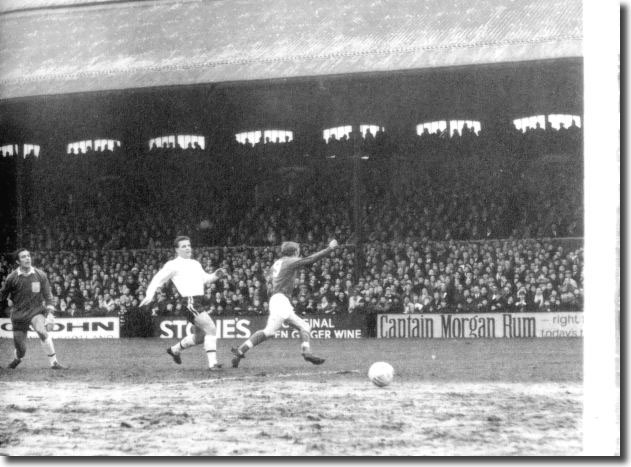
As 1968 dawned, Don Revie's Leeds
United were carrying all before them. They had recovered from a shaky
start to sit third in the First Division and were still involved in three
cup competitions.
United's first game of the year was in London. Leeds' trips to the Smoke
were usually daunting affairs, but Fulham on 6 January was not so troublesome.
The Craven Cottage club were in grave danger of losing the top-flight
status they had held for 9 years, just a point above bottom club Coventry
with three wins from ten home games.
They got scant sympathy from a fiercely competitive Whites side, now
near full strength after being without Mick Jones, Johnny Giles (both
injuries) and Billy Bremner (suspension) for many weeks. Mike
O'Grady and Albert Johanneson
were still injury victims, but their wide roles were adequately filled
by Jimmy Greenhoff and Eddie Gray.
With the regular rearguard of Sprake-Reaney-Charlton-Hunter-Cooper and
Peter Lorimer completing the line up, Leeds had a team to be feared.
Greenhoff gave United a third minute lead, slamming the ball home on
the run after a delightful through ball by Bremner. Three minutes later,
Jones collected at halfway and dribbled through, holding off three tackles
before drawing out keeper Macedo and sidefooting home.
After 28 minutes, Leeds were three up. Hunter nodded down Gray's centre
and Greenhoff shot home from 12 yards. Jones headed a fourth two minutes
after the break, and Greenhoff later grabbed his third.
Harold Mayes in the Yorkshire Post: 'As an opportunity for Leeds
to polish their undoubted skills, at a speed of thought and action so
much in advance of their unwilling pupils, that the risk of injury to
upset hopes of bigger things was non-existent, it could not have come
at a more opportune moment.'
Don Revie: 'In all the seven years I have been associated with them,
Leeds United have never played as well as they did at Fulham. It was terrific.'
They came back down to earth four days later in the Fairs Cup against
Hibs. Going into the game nursing a one goal advantage from the first
leg, United found themselves level on aggregate after just four minutes.
Eric Stanger in the Post: 'Though Leeds set off at a hustle it
was Hibernian who got the early goal to square the tie. Cormack began
a drive through the Leeds middle, Quinn put Stein through, and the centre-forward,
lying on the right of the penalty area, lobbed the ball over the head
of the advancing Sprake.'
United were vulnerable to swift Scottish attacks, and they were pegged
back for most of the game. It seemed certain that the game would go to
extra-time, but with five minutes left 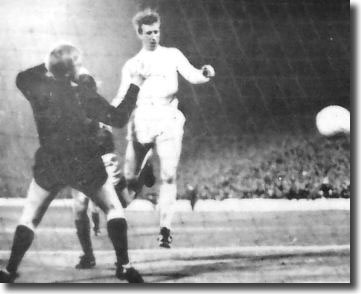 whistle
happy Welsh referee Clive Thomas penalised Hibs keeper Wilson under the
newly introduced four steps rule. With Jones, Lorimer and Greenhoff rushing
in as decoys, Giles clipped the ball to the back post for Jack
Charlton to outjump everybody and nod home a decider.
whistle
happy Welsh referee Clive Thomas penalised Hibs keeper Wilson under the
newly introduced four steps rule. With Jones, Lorimer and Greenhoff rushing
in as decoys, Giles clipped the ball to the back post for Jack
Charlton to outjump everybody and nod home a decider.
Don Revie described the game as 'Another fine example of the team's professionalism',
though he knew how close they had come to being put out of the competition.
Eric Todd in The Guardian: 'Hibernian never will forgive themselves
for not establishing themselves in an unassailable position during the
first half when Bremner and Hunter were dispossessed with most unusual
regularity. Hibernian were quicker to anticipate the lively behaviour
of the ball on the frosty pitch but that was as far as their appreciation
went. Leeds' improvement after half time denied Hibernian more than one
or two chances of increasing their first half lead.'
Refreshed by the result, United stormed to another 5-0 win at the weekend,
this time overpowering a poor Southampton side.
Eric Todd: 'Commitments in four theatres of activity will make heavy
demands on their mental and physical faculties, yet Leeds can cope. Their
teamwork on Saturday was first class in spite of the absence of Charlton,
Bremner and Gray, and the fact that their relatively unknown players almost
stole the show represented another stern warning to Lancashire's elite.
'The experience and influence of Giles again was a crucial factor, and
the response of his younger colleagues, notably Bates and Hibbitt,
was quite remarkable. Madeley, the tenant of nine different positions
during his brief career, not only reduced Davies to utter anonymity, but
scored two goals. And Cooper confirmed the general belief that he is one
of the most improved backs in the country. Leeds, indeed, are on the threshold
of greatness.
'Lorimer, having driven the ball over the crossbar from eight yards out,
put Leeds in front after nine minutes although many onlookers thought
that his raised hands and not his head had performed the deed … In the
twelfth minute Madeley scored a second goal after a rebound. Early in
the second half Martin, under the obvious impression that the ball had
gone out of play, made no attempt to catch it when Bates centred brilliantly,
but with no adverse reaction from the line, the referee allowed a goal
by Madeley. A fine shot by Hibbitt from 20 yards made it 4-0 in the sixty-eighth
minute. Ten minutes from the end Mick Jones headed a good fifth goal after
a centre by Cooper.'
Second spot secured, the Whites now entered a period of Cup activity,
with three games in three weeks against Second Division Derby County,
managed by the outspoken Brian Clough. The Rams boss was just 32, one
of the youngest managers ever, and would go on to be a fierce critic of
Don Revie and his team, but in January 1967 he purred with admiration
during an interview with the Yorkshire Post.
'It would be silly to write us off, just as it would be silly to underestimate
Leeds, who are such a good professional side with a top class manager
… They can teach my lads a lot - how hard they have to work, how much
effort and dedication is required - in short, a complete picture of what
we have to aim for in the future. Leeds must be the envy of nearly every
club in the country with their spirit and running power and large pool
of good players. People tend to underestimate their individual ability,
but make no mistake about it - these lads can play.'
The teams were paired in the two-legged League Cup semi-final and the
FA Cup third round, with the first match in the League Cup at the Baseball
Ground on 17 January.
Derby gave Leeds a stern test 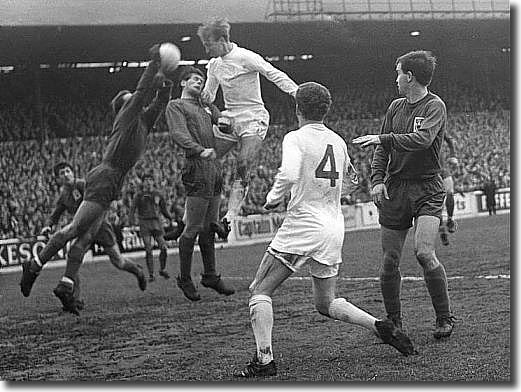 and
United needed a classic away performance and a second half Giles penalty
to secure the win. They never looked like conceding, they were simply
too experienced in the black arts of defensive play for that, but suffered
some nasty moments with Leeds-born Kevin Hector going close on several
occasions.
and
United needed a classic away performance and a second half Giles penalty
to secure the win. They never looked like conceding, they were simply
too experienced in the black arts of defensive play for that, but suffered
some nasty moments with Leeds-born Kevin Hector going close on several
occasions.
Ten days later United repeated the feat with a 2-0 FA Cup victory at
Elland Road. Charlton and Lorimer's second half goals secured a scrappy
victory.
back to top
The long running saga came to an end on 7 February with the second leg
of the League Cup semi-final.
The Rams took the game to Leeds in the opening exchanges and tied up
the aggregate scores on 12 minutes when Hector, racing in at top speed,
leaped to head O'Hare's long centre past Sprake. Derby were ahead for
little more than a minute. Lorimer was fouled at the edge of the area
and took the free kick himself. His lob was met by Madeley who nodded
down for Belfitt to fire home off
the post.
Eric Stanger: 'It was as well for Leeds that they were able to balance
their books as quickly as they did for Derby, tenacious and full of fight,
had plenty of running left in them, though Leeds, through the cleverness
of Giles, Bremner, Hunter and Cooper, at last began to move more smoothly
it meant that Derby had hurriedly to reinforce their back areas and leave
the main raiding to O'Hare, Hector and Hughes.
'In the last minute of the first half Leeds struck the mortal blow. Giles,
tireless in his efforts to keep Leeds going, set Gray off and Gray, using
Cooper as a foil on his left, dribbled past three defenders. When he shot
the luckless Matthews once more got a hand to the ball but could not stop
it going into the net.'
In the 60th minute Giles missed a penalty, but seven minutes later Belfitt
snatched his second goal following a free kick by Bremner.
Stewart netted a consolation for Derby a minute from time, but it was
too little too late and United were through to the Wembley final.
The games were coming thick and fast now. When Leeds took a 2-1 lead
at Elland Road against West Ham on 10 February, they went into their shells,
earning the wrath of demanding home supporters, as reported by Eric Stanger
in the Yorkshire Post:
'Strange things happen in football but surely nothing more strange than
Leeds United having to suffer boos, whistles and the slow handclap from
a large section of the crowd. The rumpus began about 10 minutes from the
end when Leeds decided to shut up the game and hang on to their goal lead
rather than risk West Ham snatching an equaliser. For a full three minutes
Leeds kept the ball in an area of a few square yards near West Ham's right
corner flag.
'But were Leeds wrong to employ such tactics in the circumstances? This
was their 44th game of the season, their second of the week on heavy going
and they had Bremner operating at half speed because of a knee injury.
It is the modern way to shut up the game near the end when you are narrowly
in front and deny opponents possession. It is not pretty to watch but
is it any worse than the safety first tactics of former years booting
the ball out of the ground at every opportunity? Until they decided to
shut up shop for the afternoon Leeds United's football was never negative
and often attractive.'
Don Revie: 'We had provided far more than our fair share of entertaining
football in the previous seventy-five minutes - in fact that was one of
our best performances of the season! It was our third match in seven days,
all of them being played on heavy pitches, so naturally the lads were
feeling the effects a bit. When you're involved in so many important matches,
no team can 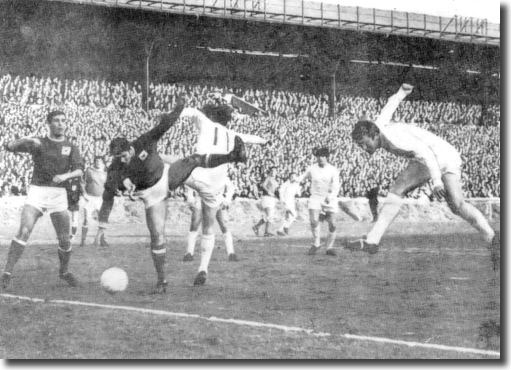 afford
to do a lot of unnecessary tearing about. Any team would do the same as
Leeds in this situation - if they had the skill.'
afford
to do a lot of unnecessary tearing about. Any team would do the same as
Leeds in this situation - if they had the skill.'
When Leeds repeated the feat a week later, as they protected another
2-1 lead, at home to Forest in the FA Cup fourth round, the fans' reaction
was more positive. Stanger: 'Circumstances alter cases. When, with only
a few minutes to go at Elland Road on Saturday in the FA Cup-tie, Leeds
United again kept the ball tight near their opponents' corner flags there
was no booing or slow handclapping this time, only cheers of relief from
spectators who had been kept on a knife-edge of anxiety all the second
half. They were glad to see Leeds hang on. Entertainment was secondary.'
It had been a bitter contest. Forest used every method allowed, and some
that weren't, to destroy the Bremner-Giles link and threw Leeds badly
off their game.
Eric Todd reported in The Guardian: 'Not often does Elland Road
house a crowd of 50,000 plus and the local constabulary and St John Ambulance
men dealt admirably with the phenomenon this day … One of these days perhaps
a uniformed inspector of police will referee a key game, and then the
punishment will fit the crime. Allowances should of course by made for
inevitable tension, yet Mr Taylor was extravagantly tolerant. Granted
that he might not have seen Lorimer deliver a right cross to Winfield's
stomach, he scarcely could have failed to observe a set to between Hunter
and Baker right under his nose. But he took no names and, like so many
referees these days, he subscribed to the optimistic view that players
are terrified by a wagging finger, or that a soft answer will turn away
wrath.
back to top
'Another sad feature was that Forest conceded three times as many free
kicks as did Leeds. Forest are under the management of Mr J J Carey, a
gentleman among gentlemen as a player, and now a picture of pipe smoking
benevolence. Can it really be possible that Mr Carey, like one or two
others of his kind, is only a figurehead and that anarchic influences
are being exercised by underlings? I find it hard to believe that they
were Carey's chickens who perpetrated 26 fouls against United's eight.
'Not that all the Leeds players may be numbered among the cherubims and
seraphims, so to say, but things might have been different if Sprake had
not been removed on a stretcher after five minutes. He damaged his right
knee in making a brave save from Wignall, who was completely blameless
but who thereafter was baited unmercifully by the partisans and who departed
limping early in the second half. So much for reprisals.
'If Forest had concentrated on football and less on personal vendettas,
they might have won. Hennessey played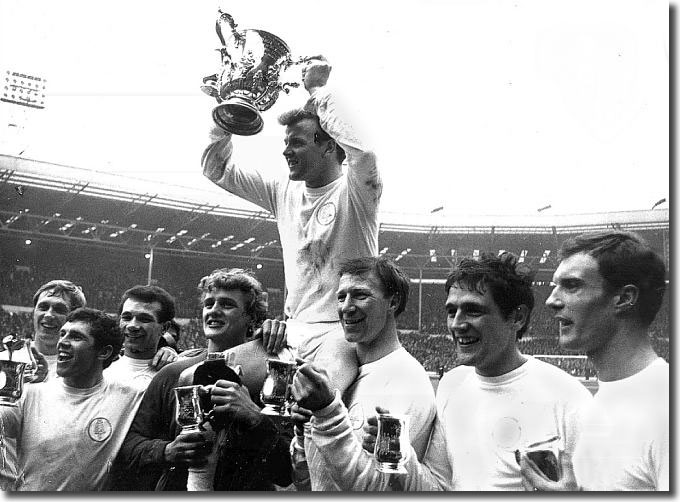 a superb game, and Newton and Winfield were not far behind in all round
quality. On the move Forest had speed and method, but they were betrayed
by bad finishing and bad temper.
a superb game, and Newton and Winfield were not far behind in all round
quality. On the move Forest had speed and method, but they were betrayed
by bad finishing and bad temper.
'Leeds never could be accused of timidity. On Saturday, however, they
looked uncomfortable and often uncertain. Their forwards were disappointing
and the great Giles was no exception. Bremner made more mistakes than
is his wont and only Reaney, whom I have not seen in better form, and
the irrepressible Cooper kept Leeds out of serious trouble, especially
in the second half when they were under siege for half an hour at a stretch.
Nevertheless to win with a crippled goalkeeper after being a goal down
is a splendid feat, and Leeds surely must appear in the honours list this
term.'
Leeds, wearied by all their efforts, could enjoy a couple of weeks off
before their next assignment, the League
Cup final at Wembley against Arsenal on 2 March. There were doubts
about the fitness of Charlton, Sprake, Giles and Greenhoff, but all were
in Don Revie's selection, though he was deprived of the cup-tied Mick
Jones, and opted for the versatile Paul Madeley at No 9.
United had promised an attacking display to wipe out the memory of their
previous Wembley appearance, but Giles was below par and struggled to
contribute. An 18th minute volley by Terry Cooper gave Leeds an early
lead, and the temptation was just too strong. They settled into a containing
game and had little difficulty in withstanding Arsenal's limited attacking
thrusts.
United faced fierce criticism, but few could blame them after years of
near misses, and the silverware was far more important than being liked.
The result was a metaphorical two fingers to the critics, and secretly
United rather liked being hated - it meant they were doing their job properly,
even though Revie would never admit as much in public. His paranoia often
spilled over in a silent claim that 'everyone's out to get us.'
Don Revie was particularly relieved, revealing later, 'Before the final,
I was seriously thinking of goading the lads by opening an empty trophy
case and telling them: 'This is what you have to show for all your sweat
and toil in recent seasons!' I hate to think what might have happened
had Leeds lost this one, too. You can only take so many disappointments....
back to top
'I wanted Leeds to play attractively as much as anyone, but under the
circumstances, we would have been foolish to attempt to do this. We were
playing with virtually nine fit men. I would never have included Greenhoff
and Giles had this been an ordinary league or cp game, not in their physical
condition. But these two had been playing superbly, and I reasoned that
they would boost the rest of the team just by their presence on the field.'
| |
Top of First Division - 20 March 1968 |
| |
Pos
|
|
P
|
W
|
D
|
L
|
F
|
A
|
Pts
|
| |
1st
|
Leeds
United |
32
|
17
|
9
|
6
|
54
|
26
|
43
|
| |
2nd
|
Manchester
City |
31
|
19
|
5
|
7
|
69
|
34
|
43
|
| |
3rd
|
Manchester
United |
31
|
18
|
7
|
6
|
60
|
38
|
43
|
| |
4th
|
Liverpool |
31
|
16
|
9
|
6
|
49
|
27
|
41
|
When United returned to FA Cup action, the fifth round clash against
Bristol City brought more controversy. Goals from Jones and Lorimer in
the eleven minutes before half-time put United in a commanding position,
but the game finished with ugly scenes as Gary Sprake was sent off. The
incident was sparked when Chris Garland brought Billy Bremner down. As
referee Dimond rushed over to book him, all hell let loose with Sprake
punching Garland after he spat in his face. Lorimer took over in goal
for the last few minutes and was not tested as United secured a straightforward
victory. Don Revie breathed a massive sigh of relief and departed Ashton
Gate to plot United's next steps.
Three straight draws followed in the league, yet those points were enough
to take Leeds top, level on points with Manchester City and Manchester
United, but ahead on goal average.
Leeds now faced second placed City in a crucial match, played before
a crowd of 51,818, Elland Road's best of the season.
The Mancunians had been playing some breathtaking attacking football,
sparked by the talents of Francis Lee, Mike Summerbee and Colin Bell.
They were quickly on the move and clever combination left Lee a shot which
Sprake saved before 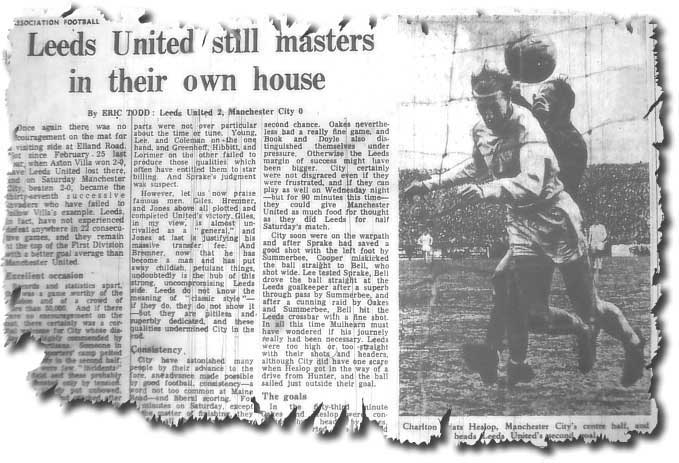 making
a point blank stop as Bell followed up. Bell later hit the bar and had
a goal disallowed.
making
a point blank stop as Bell followed up. Bell later hit the bar and had
a goal disallowed.
After the break, with substitute Madeley partnering Jones up front, Leeds
were much better and Giles opened the scoring with a low 20 yard drive
after 52 minutes.
15 minutes later Charlton headed home a Giles cross to give Leeds a 2-0
victory, extending their unbeaten run to 22 matches. Eric Todd praised
their performance in The Guardian: 'Giles, in my view, is almost
unrivalled as a general and Jones at last is justifying his massive transfer
fee. And Bremner is the hub of this strong, uncompromising Leeds side.
Leeds do not know the meaning of "classic style" - if they do,
they do not show it - but they are pitiless and superbly dedicated, and
these qualities undermined City in the end.'
The business end of the season was upon them as United returned to Fairs
Cup action, with the first leg of their quarter final tie, at Ibrox against
Glasgow Rangers.
Rangers, backed by 80,000 fanatical supporters, tried everything they
knew to secure an advantage, but could not find any way through, as John
Begg reported in the Yorkshire Post: 'The rear line were simply
magnificent, especially in the second half when Rangers, with the wind
behind them, tried everything in a desperate attempt to get in front.
But all to no purpose. Charlton and his full-backs had every road towards
Sprake sealed off. Anything that this trap missed - and that was seldom
- was very capably dealt with by Sprake. His handling was immaculate and
eventually he broke the heart of the Rangers attack.'
Don Revie was delighted, saying, 'This is the result we came for. Rangers
played much as we expected them to, but it isn't over yet. Don't forget
we have to take some risks at Elland Road in order to win the tie, and
Rangers are an extremely accomplished and experienced side. However, I
got one of the forms of result I wanted, a good result, and I think the
boys were splendid.'
back to top
Two weeks later, United finished off the task. They took a while settling,
but went ahead through a Giles penalty after 25 minutes when Alex Ferguson
handled. Five minutes later, a Giles lob into the area was missed by Greenhoff,
but Lorimer made no mistake.
United rarely surrendered a 2-0 lead. 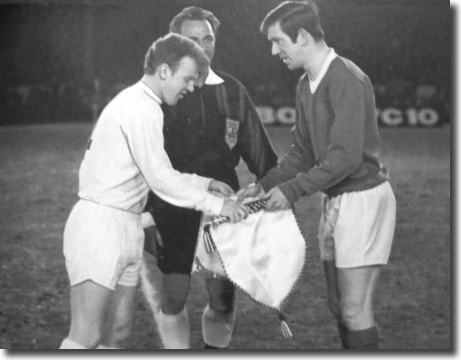 The
Scots had a number of decent chances, but the biggest danger to substitute
goalkeeper Harvey was from the missiles thrown by Rangers fans. Gers skipper
John Greig was called up by referee Tschenscher to appeal for calm.
The
Scots had a number of decent chances, but the biggest danger to substitute
goalkeeper Harvey was from the missiles thrown by Rangers fans. Gers skipper
John Greig was called up by referee Tschenscher to appeal for calm.
In between legs, United had gained two straightforward Elland Road victories
over Sheffield United, 1-0 in the FA Cup, and 3-0 in the league, thanks
mainly to two penalties from Giles.
Leeds were thus in an extraordinary position - with the League Cup already
in the bank, they were in the last four of both the FA Cup and the Fairs
Cup and leading the league. Rarely has a team held such a strong hand
in the closing weeks of the season.
The Easter period kicked off in unpromising fashion at Tottenham. Leeds
conceded their first goals in seven games and saw the end of a 26-game
unbeaten run. The same day, Manchester United regained the First Division
leadership by beating Fulham 4-0 at Craven Cottage. Manchester City closed
up in third by beating Chelsea, though fourth-placed Liverpool surprisingly
lost 2-1 at Anfield against Sheffield United.
United were still in a strong position and two 1-0 wins, away to Coventry
and home to Spurs, left them well placed. A 3-1 win at home to West Bromwich
Albion kept up the spirits, though Manchester United retained supremacy
with a 1-0 victory over Sheffield United. With Manchester City dropping
a point at Wolves, it looked like the title would go to one of the two
Uniteds.
Leeds had the chance to regain top spot on Tuesday, 23 April, as they
played their match in hand, away to a Stoke City side that was second
bottom of the table. It looked like an easy two points, but things have
never been straightforward for Leeds.
The Whites encountered a team fighting for its life and were on the back
foot from the first whistle. They could have been two goals down in the
first ten minutes. Sprake denied winger Harry Burrows with a one-handed
save and centre-half Alan Bloor hit the bar from long range. United were
lethargic and casual and were soon trailing to a Peter Dobing goal. Dobing
added a second before the break.
| |
Top of First Division - 20 April 1968 |
| |
Pos
|
|
P
|
W
|
D
|
L
|
F
|
A
|
Pts
|
| |
1st
|
Manchester
United |
39
|
23
|
8
|
8
|
79
|
47
|
54
|
| |
2nd
|
Leeds
United |
38
|
22
|
9
|
7
|
65
|
29
|
53
|
| |
3rd
|
Manchester
City |
38
|
22
|
6
|
10
|
76
|
39
|
50
|
| |
4th
|
Liverpool |
37
|
19
|
10
|
8
|
57
|
34
|
48
|
| |
5th
|
Everton |
37
|
21
|
5
|
11
|
58
|
35
|
47
|
United got a rocket from Don Revie and came out fighting. They were soon
level, with Greenhoff getting the first and Charlton heading in from a
corner.
Slackness and lack of concentration allowed Dobing to complete his hat
trick, but United continued to pound away. They threw everything at Banks'
goal, with Hunter hitting the post, Jones forcing the keeper into a tremendous
one handed save, a confident penalty appeal turned down and Greenhoff
blasting the ball wide with the goal at his mercy. The home fans were
living on their nerves, but their men held out to boost their chances
of survival and send United's hopes plummeting.
It was a bitter blow, and there was little chance for Revie's men to
catch their breath. Four days later, they
faced Everton in a highly charged FA Cup semi final at Old Trafford.
Misfortune had befallen Gary Sprake
just before Christmas at Anfield, when he threw the ball into his
own net, and he had another Merseyside cross to bear following the semi
final. Just before half-time Everton striker Joe Royle harried him as
he made to clear and his weak kick fell to Husband who sent the ball back
towards the net. Jack Charlton handled and Morrissey converted the penalty.
back to top
It was the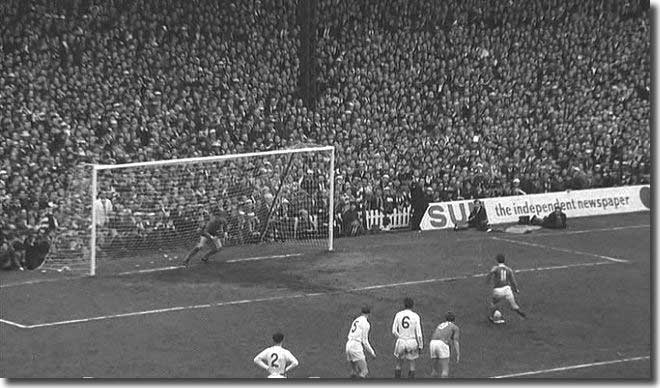 only goal of a bad-tempered contest and left Leeds with only the Fairs
Cup to play for. A winter's stirring work had been undone in the space
of five April days.
only goal of a bad-tempered contest and left Leeds with only the Fairs
Cup to play for. A winter's stirring work had been undone in the space
of five April days.
The following Wednesday brought the first leg of the Fairs Cup semi-final,
away to Dundee as United went for a hat trick of victories against Scottish
opposition.
Dundee never managed to press United in the manner that Hibs and Rangers
had but Leeds had to be content with a 1-1 draw from the first leg. They
had looked to be happy to settle for the draw for most of the game. They
could be excused for taking their foot off the accelerator - this was
the 62nd game of a marathon season.
On Saturday 4 May, United faced another major battle, at home to fourth-placed
Liverpool. They were a point behind the two Manchester clubs, but retained
a game in hand. A win was essential for their brittle title hopes.
They started well enough and took the lead after a quarter of an hour
with a brilliant goal. Giles, back to something approaching his best,
intercepted a Liverpool pass deep in his own half and shipped on quickly
to Lorimer who was just onside, a few feet inside Liverpool's half. The
Scot outpaced his challengers and fired the ball onwards for Jones to
score spectacularly.
Leeds had other chances but did not have the best of luck, as Richard
Ulyatt reported in the Yorkshire Post: 'Had it been otherwise,
Leeds would surely have had a penalty when Yeats was thought by many players
and most spectators but not by the referee to have handled in the penalty
area as he repelled an attack by the lively Jones; a header by Jones would
have dipped under the crossbar instead of, with Lawrence the goalkeeper
on the ground, hitting the bar; Greenhoff would have shot hard and true
with a goal apparently there for the taking instead of stubbing his toe;
and Lorimer instead of knocking Hateley out with a shot which must have
felt like the explosion of a 25-pounder to the unfortunate recipient might
have broken the back of the net.'
Eric Todd takes up the story in The Guardian: 'Leeds were leading
1-0 with six minutes to go, and defeat seemed certain for the invaders.
Inexplicably, Leeds fell back on the defensive and Liverpool, who seldom
had looked like scoring, swept into the attack. Cooper and Hateley had
not reached the dressing rooms when Callaghan took a corner on the left.
Harvey punched the ball high into the air, Thompson headed it back, Yeats
hit a post with a header, and Lawler scored at the second attempt.
'Less than a minute after that, Strong forced another corner which Callaghan
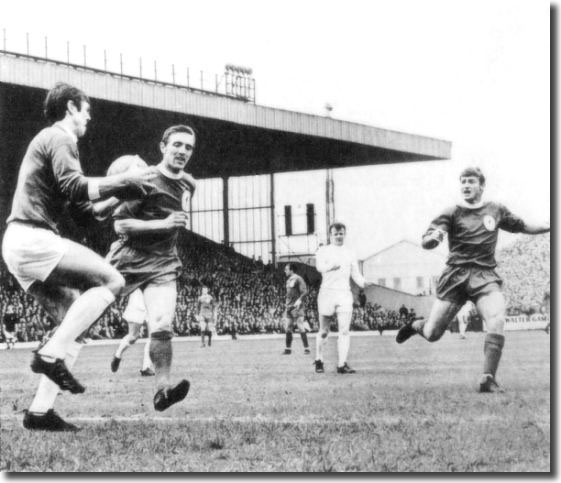 took,
this time on the right. Yeats again headed the ball against the goal structure.
Lawler had a go, so, too, did Graham and it was confirmed later that Liverpool's
substitute had applied the crucial finishing touch. Leeds battled on to
the end, and after Lorimer had missed by inches, Yeats had his name taken
for upending Bremner on the high road to Liverpool's goal.
took,
this time on the right. Yeats again headed the ball against the goal structure.
Lawler had a go, so, too, did Graham and it was confirmed later that Liverpool's
substitute had applied the crucial finishing touch. Leeds battled on to
the end, and after Lorimer had missed by inches, Yeats had his name taken
for upending Bremner on the high road to Liverpool's goal.
'Ironical it was above all that their defence, their pride and joy these
many months, should be found wanting in the final analysis. In width and
depth it was far too much for Liverpool for all but the last ten minutes
and Harvey and Madeley were admirable deputies for Sprake and Charlton.
Once again the Leeds forwards performed adequately and no more, although
Jones was a great trier and he deserved his goal after a brilliant movement
by Giles and Lorimer in the fifteenth minute.'
With Manchester City pulling off a 3-1 victory at Tottenham and Manchester
United hammering Newcastle 6-0, the home defeat left Leeds' title hopes
in tatters. Leeds now needed both of their rivals to lose their remaining
game.
back to top
The Whites had a match in hand, which came during the following week
at Arsenal. Leeds would play without Hunter and Cooper, both on England
duty, and the injured Sprake and Charlton. That left the United defence
in ribbons - even Paul Reaney was played out of position, on the left,
with Nigel Davey at right-back. There
was no way in such circumstances that the usual assurance would be there.
Arsenal scored four times, but Leeds equalised on three occasions and
pummelled the Gunners for the last 15 minutes - the Londoners emerged
victorious with a fourth strike seconds from time.
That ended even mathematical impossibilities. For the final league game,
a meaningless trip to Burnley, Don Revie fielded a second string outfit
(including Belfitt, Bates, Hibbitt, Davey, Sibbald,
Yorath and Lumsden, with Madeley and Gray playing in central defence).
United lost 3-0 to end the season in fourth spot. It was their fifth defeat
in six games.
For the visit of Dundee in the second leg of the Fairs Cup semi-final,
Don Revie recalled all of his regulars, save Jack Charlton, still out
with the ankle he jarred in the first leg in Scotland. United went into
the second leg with the advantage of an away goal, and it was just as
well, for they struggled. They only got their attacking act together in
the final 30 minutes, during which they struck the woodwork twice.
It seemed likely that the game would end goalless, but after Sprake made
a decent save from Scott, Gray drove in an 80th minute winner. It was
enough to earn United a place in the final for the second year in succession.
As with the previous final, fixture congestion meant that the two-legged
tie was held over to the autumn, bringing relief to United's weary warriors.
They had played 66 times in a momentous season and were fit to drop. Eric
Todd in The Guardian: 'Almost inevitably, Leeds did not finish
in the grand manner. In recent weeks they have played almost by instinct,
almost automatically and it is as true now, as ever it was, that no matter
how great the heart and spirit, how strong the determination and dedication,
all these qualities can be cancelled out by waning physical strength.
Sixty-six matches! Heaven preserve us! It makes you tired even to think
about such a programme. That Leeds finished on their feet at all is something
of which they can be proud.'
Their opponents in the final were Ferencvaros, acknowledged as one of
the continent's finest teams. With the first leg at home on 8 August,
there was no early league action to get their eye in and Leeds were pitched
straight into one of the biggest games in the club's history.
The Hungarians opted for a containing
game at Elland Road, convinced they could finish 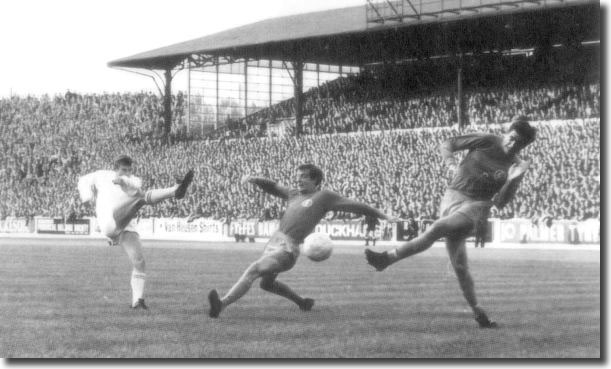 United
off in Budapest. They adopted some questionable tactics and gave United
problems. Charlton's pressure at a first half corner created mayhem in
the area and Jones forced home the ball to secure a narrow advantage.
United
off in Budapest. They adopted some questionable tactics and gave United
problems. Charlton's pressure at a first half corner created mayhem in
the area and Jones forced home the ball to secure a narrow advantage.
Popular opinion was that the Hungarians would have enough firepower to
overpower Leeds in the Nep Stadium.
But Don Revie's men were battle-hardened and one of the most adept teams
in the world at protecting a lead. With
Gary Sprake giving the performance of his life, Leeds turned on a classic
defensive display. They withstood a blistering offensive performance
from Florian Albert and Co and emerged unscathed. Sir Stanley Rous presented
the Inter Cities Fairs Cup to Billy Bremner as Leeds became the first
British winners of the trophy.
The Whites may not have won the four trophies they had pursued through
an extraordinary season, but they had secured two trophies in the space
of six months. They had laid to rest once and for all the tag of being
champion runners up. Leeds United were finally winners and on the verge
of greater things.
Part 1 - The Revie effect - Results
and table
Other Football Highlights from 1967/68
- Celtic's clash with Racing Club of Argentina for the world club championship
was the unacceptable face of football at its very worst. Celtic beat
the South Americans in a niggling first leg at Hampden, but that only
set up a terrifying atmosphere for the second leg. Celtic keeper Ronnie
Simpson was felled by a stone and knocked unconscious as the teams walked
on to the pitch. Celtic took the lead through a first half penalty,
but had the water cut off to their dressing room at half time, leading
them to refusing to come back out until it was restored. Racing scored
twice in the second half to necessitate a replay which was held in Uruguay.
Four players from Celtic and two from Racing were dismissed in a violent
brawl of a match, which the Argentinians won 1-0
- Struggling Second Division side Cardiff City progressed all the way
to the Cup Winners' Cup semi-finals after winning the Welsh Cup the
previous year. They lost 4-3 on aggregate to Hamburg
- West Bromwich Albion won a turgid FA Cup final at Wembley against
Everton with a single goal from Jeff Astle
- Spurs goalkeeper Pat Jennings scored a goal against Manchester United
in the Charity Shield when a long, punted clearance was caught by the
wind and bounced over United keeper Alex Stepney
- Matt Busby, the Manchester United manager, was knighted
- Goalkeepers were limited to taking four steps with the ball by the
International Board
- Manchester City won the league title for the second time in dramatic
style as they pipped their illustrious neighbours United on the very
last day of the season
- England had mixed fortunes in their European Championship campaign.
They finished a consoling third, but Alan Mullery's dismissal in the
semi-final against Yugoslavia seriously dented England's international
image. In the final Yugoslavia took hosts Italy to a replay before succumbing
2-0
- Ten years after the Munich air disaster, Manchester United finally
won the one trophy that mattered more to the club than any other, the
European Cup. They beat old masters Real Madrid in an astonishing semi-final
before meeting Portugal's Benfica in the final at Wembley. United took
the lead with a rare headed goal from Bobby Charlton but were pegged
back by a Benfica equaliser 15 minutes from time. Extra-time found Benfica
exhausted and a dazzling individual goal from George Best gave them
the lead. A goal from Brian Kidd on his 19th birthday and a second strike
from Charlton brought United the trophy for the first time
- The British transfer record was broken twice, first when Martin Chivers
moved from Southampton to Tottenham for £125,000 and then again when
Allan Clarke joined Leicester from Fulham for £150,000
back to top













 whistle
happy Welsh referee Clive Thomas penalised Hibs keeper Wilson under the
newly introduced four steps rule. With Jones, Lorimer and Greenhoff rushing
in as decoys, Giles clipped the ball to the back post for Jack
Charlton to outjump everybody and nod home a decider.
whistle
happy Welsh referee Clive Thomas penalised Hibs keeper Wilson under the
newly introduced four steps rule. With Jones, Lorimer and Greenhoff rushing
in as decoys, Giles clipped the ball to the back post for Jack
Charlton to outjump everybody and nod home a decider. and
United needed a classic away performance and a second half Giles penalty
to secure the win. They never looked like conceding, they were simply
too experienced in the black arts of defensive play for that, but suffered
some nasty moments with Leeds-born Kevin Hector going close on several
occasions.
and
United needed a classic away performance and a second half Giles penalty
to secure the win. They never looked like conceding, they were simply
too experienced in the black arts of defensive play for that, but suffered
some nasty moments with Leeds-born Kevin Hector going close on several
occasions. afford
to do a lot of unnecessary tearing about. Any team would do the same as
Leeds in this situation - if they had the skill.'
afford
to do a lot of unnecessary tearing about. Any team would do the same as
Leeds in this situation - if they had the skill.' a superb game, and Newton and Winfield were not far behind in all round
quality. On the move Forest had speed and method, but they were betrayed
by bad finishing and bad temper.
a superb game, and Newton and Winfield were not far behind in all round
quality. On the move Forest had speed and method, but they were betrayed
by bad finishing and bad temper. making
a point blank stop as Bell followed up. Bell later hit the bar and had
a goal disallowed.
making
a point blank stop as Bell followed up. Bell later hit the bar and had
a goal disallowed. The
Scots had a number of decent chances, but the biggest danger to substitute
goalkeeper Harvey was from the missiles thrown by Rangers fans. Gers skipper
John Greig was called up by referee Tschenscher to appeal for calm.
The
Scots had a number of decent chances, but the biggest danger to substitute
goalkeeper Harvey was from the missiles thrown by Rangers fans. Gers skipper
John Greig was called up by referee Tschenscher to appeal for calm. only goal of a bad-tempered contest and left Leeds with only the Fairs
Cup to play for. A winter's stirring work had been undone in the space
of five April days.
only goal of a bad-tempered contest and left Leeds with only the Fairs
Cup to play for. A winter's stirring work had been undone in the space
of five April days. took,
this time on the right. Yeats again headed the ball against the goal structure.
Lawler had a go, so, too, did Graham and it was confirmed later that Liverpool's
substitute had applied the crucial finishing touch. Leeds battled on to
the end, and after Lorimer had missed by inches, Yeats had his name taken
for upending Bremner on the high road to Liverpool's goal.
took,
this time on the right. Yeats again headed the ball against the goal structure.
Lawler had a go, so, too, did Graham and it was confirmed later that Liverpool's
substitute had applied the crucial finishing touch. Leeds battled on to
the end, and after Lorimer had missed by inches, Yeats had his name taken
for upending Bremner on the high road to Liverpool's goal. United
off in Budapest. They adopted some questionable tactics and gave United
problems. Charlton's pressure at a first half corner created mayhem in
the area and Jones forced home the ball to secure a narrow advantage.
United
off in Budapest. They adopted some questionable tactics and gave United
problems. Charlton's pressure at a first half corner created mayhem in
the area and Jones forced home the ball to secure a narrow advantage.